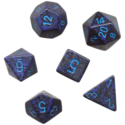

| Part of a series on |
| Role-playing games |
|---|
 |
| Types |
| Topics |
| Terminology |
| Lists |
|
|
|
|
|
Role-playing games (RPGs) have developed specialized terminology. This includes both terminology used within RPGs to describe in-game concepts and terminology used to describe RPGs. Role-playing games also have specialized slang and jargon associated with them.
Besides the terms listed here, there are numerous terms used in the context of specific, individual RPGs such as Dungeons & Dragons (D&D), Pathfinder, Fate, and Vampire: The Masquerade. For a list of RPGs, see List of role-playing games.
{{cite book}}: CS1 maint: location missing publisher (link)
{{cite book}}: |work= ignored (help)
{{cite web}}: CS1 maint: numeric names: authors list (link)
{{cite book}}: CS1 maint: others (link)
{{cite book}}: CS1 maint: location missing publisher (link) CS1 maint: others (link)
{{cite book}}: CS1 maint: others (link)
[52'43"] On a Natural 20, incredible things are possible: if you hit a 20 on the die, it's an overwhelming success. [...] [52'52"] And the reverse, if you manage to roll a Natural 1...
[pp. 10] The ancestors of MMORPGS were text-based multiuser domains (MUDs) [...] [pp. 291] Indeed, MUDs generate perhaps the one historical connection between game-based VR and the traditional program [...]
{{cite book}}: CS1 maint: location missing publisher (link)
{{cite book}}: CS1 maint: location missing publisher (link)
{{cite book}}: CS1 maint: others (link)